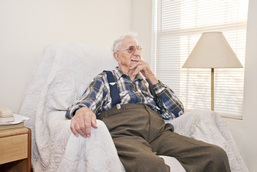Urgent need to tackle loneliness among the over 85s
More must be done to combat loneliness and isolation among Britain’s oldest residents, a new report from liberal think tank CentreForum argues.

The think tank warns that more than half of over 85s, the country’s fastest growing age group, feel lonely some or all of the time. It says this is not just a personal tragedy for the individuals affected but places pressure on the NHS through related health problems and on the care services sector. Socially isolated and lonely adults are more likely to be admitted to residential and nursery care early, it points out.
The report, Ageing Alone, contains case studies that show how loneliness among older people is being tackled across the UK. But it says that access to services is patchy and there is a need for relevant organisations to work together to reach isolated over 85s. Loneliness in general is under regarded as a health priority, it adds.
The report finds among other things that only around half of local Health and Wellbeing Boards which have published a Joint Health and Wellbeing Strategy acknowledge loneliness and isolation in their plans. In response, it says that more research needs to be undertaken by government on the financial costs of loneliness as the number of people aged 85 and over increases.
Other recommendations include a requirement on all Health and Wellbeing Boards to address loneliness within their Joint Strategic Needs Assessments (JSNAs), and call for more structured opportunities for volunteers to build relationships with older people.
Norman Lamb, minister for care and support, said: "Loneliness needs to be tackled by a change in society’s attitude. Every one of us can help to combat loneliness and we all need to be more creative about how we help elderly people and the chronically lonely to feel more a part of their society.
“We are working with partners like the Campaign to End Loneliness to reduce levels of loneliness and help people to understand the link between people's relationships and their mental and physical health and wellbeing. I am pleased to see CentreForum focusing on this important area."
James Kempton, associate director at CentreForum and co-author of the report, said: “Growing older does not have to mean growing lonelier. There are fantastic projects out there showing how you can make a huge difference. But too many of the oldest old are missing out and that will only get worse as life expectancy increases.
“Loneliness is a personal tragedy and as a society we should be aiming to do more. A key first step is for government and the new health and wellbeing boards to the recognise loneliness as an important public health priority.”
Caroline Abrahams, charity director at Age UK, said: “We are delighted to support this CentreForum project because the evidence increasingly shows that loneliness not only makes life miserable for far too many older people, it also represents a real threat to their health.
“At the moment we aren't doing enough in this country to help older people avoid and overcome loneliness, and many of the local services that we know older people value, like lunch clubs, are struggling to survive because of council funding cuts.
“We hope this report will inspire local and national policymakers to want to do more, and give them the tools to know how to do so effectively."
Latest News
 29-Jul-24
Dementia Bus gives carehome.co.uk staff insight into life with dementia
29-Jul-24
Dementia Bus gives carehome.co.uk staff insight into life with dementia
 01-Mar-24
Find out the top care homes in 2024
01-Mar-24
Find out the top care homes in 2024
 21-Mar-23
UK's top care homes in 2023 revealed
21-Mar-23
UK's top care homes in 2023 revealed
 03-Jan-23
carehome.co.uk launches free care helpline
03-Jan-23
carehome.co.uk launches free care helpline
 13-Dec-22
5 mins with Emily Whitehurst, chief operating officer for Constantia Healthcare
13-Dec-22
5 mins with Emily Whitehurst, chief operating officer for Constantia Healthcare